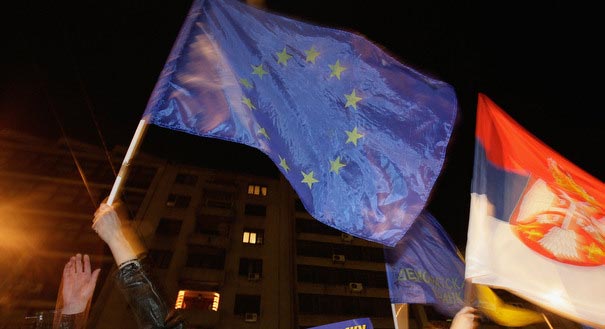There was huge excitement at the annual Globsec meeting in Bratislava when the news broke that Kosovo and Serbia had signed a historic deal.
The excitement was a welcome reprieve for conference delegates. During three days of panel discussions, hardly a good word had been said about the EU. You would think the entire postwar European edifice was about to collapse.
Then came the Kosovo-Serbia agreement—aimed at normalizing relations between the two neighbors—that could close one of the last and most complicated chapters of the bloody Yugoslav wars.
The deal, which sets out a complex system of power-sharing and autonomy for the Serb minority in northern Kosovo, reveals two important things about the EU.
The first is how the European club continues to be enormously attractive to potential members. That is despite the euro crisis and all the (often justified) criticism about the EU’s foreign and defense policy. “The continuing lure of the EU [should] not be underestimated,” said Ian Brzezinski, senior fellow at the Atlantic Council, a Washington-based think tank. If Serbia had not become an EU candidate member last year, it is highly unlikely the Belgrade leadership would have negotiated with Kosovo.
The second revelation is the special role played by Catherine Ashton, the EU’s top diplomat. For once, no European leader or foreign minister tried to undermine her. And for once, too, because of her personal friendship with former U.S. secretary of state Hillary Clinton, Ashton was given a free hand by Washington to broker the accord.
“Without Ashton, the deal would not have been possible,” said Sonja Licht, a veteran prodemocracy activist and president of the Belgrade Fund for Political Excellence, an NGO. “Ashton never bragged. She created an atmosphere of trust for the leaders. She handed the EU a great success.”
But all observers of Kosovo and Serbia agree that once the euphoria ends, the hard work will begin.
Licht is right when she says extremists on either side could attempt to sabotage the deal because they would lose their raison d’être. Serbian Prime Minister Ivica Dačić and his Kosovar counterpart, Hashim Thaçi, will have to work very hard to sell the agreement to their constituents.
Implementation will be crucial too. The EU will have to do a far better job than it has to date in helping to build strong institutions in Serbia and Kosovo. Neither state will prosper if corruption remains endemic.
The accord has implications for the rest of the western Balkans region. The deal just might encourage ethnic groups in Bosnia to put their enmity behind them and finally build a functioning state. The Bosnian Serbs have seen how Belgrade has pursued a pragmatic, pro-European strategy, making their own course of establishing a Serb “statelet” within Bosnia far more difficult.
There is also the unresolved Macedonia naming dispute. Greece, thanks to its veto power in the EU and NATO, has been able to prevent the former Yugoslav republic from calling itself Macedonia. Greece has also blocked EU and NATO talks with Skopje in order to maintain leverage over its northern neighbor. For the most part, international institutions have bowed to Greek pressure, using the absurd acronym of FYROM (former Yugoslav Republic of Macedonia).
The EU needs to confront Montenegro’s rampant corruption as well, not to speak of “clientelism” and trafficking in Albania. The EU has a lot of unfinished business in the western Balkans. It should persist.
The Kosovo-Serbia deal also has positive repercussions beyond the immediate neighborhood of the Balkans.
For prodemocracy and pro-European movements, especially in Belarus and Moldova, the accord shows that the EU is effective when it chooses to use its entire panoply of soft-power tools. But how can the EU apply these instruments to countries like Belarus or Moldova?
“The Kosovo-Serbia deal is good news for us. But there is really no template. Each conflict is so different,” said Andrei Sannikov, a Belarusian opposition leader who challenged President Aleksandr Lukashenko at the 2010 election. He was subsequently imprisoned along with hundreds of other prodemocracy activists. After his release last year, he fled to Britain, where he now coordinates the project European Belarus, which campaigns for EU membership for the former Soviet state.
“The EU should toughen the sanctions against the regime and do much more to support activists and the independent media. The EU should become relevant to Belarusians,” Sannikov added.
The EU is working hard to make itself relevant in Moldova, where a pro-European political movement is trying to orientate the country toward Europe. The biggest problem is the breakaway region of Transnistria. There, a Moscow-backed movement is using this frozen conflict to help the Kremlin maintain its influence in this part of Europe.
Ashton could do much more in both Belarus and Moldova, but she needs unanimous support from the member states. Without the perspective of eventual EU membership, which exists for Serbia and Kosovo, her job vis-à-vis Moldova or Belarus is much more difficult. Yet it remains very much in Europe’s interest to foster democracy beyond the EU’s borders.






.jpg)